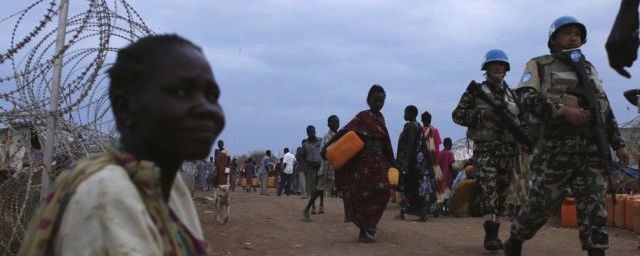Residents of the UN-protected displaced camp in Malakal who commit crimes will be held at a new detention facility operated by UN Police. The facility will serve the Malakal camp population, which has reached to 18,700, many of whom have lived five or more months under UN protection.
The UN Mission in South Sudan (UNMISS) says the new site is part of an effort to boost security in the ‘protection of civilians (PoC) areas’. Previously the mission has sometimes detained violent individuals in makeshift detention areas such as containers, which has been problematic.
In an article published on the mission’s website on Tuesday, the peacekeeping mission stated, “the UNMISS Security Risk Assessment Committee is building a new detention facility for suspects and working with the internally displaced persons (IDP) Security and Peace Committee to reduce offenses.”
The head of the IDP Security and Peace Committee, Mathew Chol Jock, says the high level of crime within the Malakal camp sites “has dramatically reduced, especially after setting up the holding facility for suspects.”
Minor criminal cases like alcohol consumption and fighting are usually handled by traditional leaders in the camp. Criminal cases cannot be referred to a court in Malakal because the town has been razed and remains mostly abandoned.
Additionally, many residents of the PoC sites fear being targeted for their ethnicity should they leave UN protection and enter the government-controlled town.
Without government policing and courts of justice, the population is left to administer itself with UN Police handling more serious cases requiring detention. Acting UN Police (UNPOL) State Advisor Mathias Yevugah said that they have an investigation team that goes out into the camp daily to take statements and do their own investigations.
The team reports to the “Security Risk Assessment Committee,” which includes representatives of UN Police as well as the UNMISS Security, Justice Advisory, Corrections, Human Rights and Civil Affairs sections.
“The committee deals with minor crimes, but hands over more serious cases like murder or rape to Juba for further investigation,” says the UNMISS statement.
Yevugah said that criminal suspects are not released back into the community because that is risky, so they are instead detained. He said the current detention facility “meets international standards.”
According to the UN, consumption of alcohol in the camp areas is one of the main challenges, as it “creates disturbances and stimulates crimes like rape, robbery and murder.”
Photo: UN peacekeepers patrol in the camp for displaced people inside the UNMISS compound in Malakal, 4 March 2014 (Reuters/Andrea Campeanu)
For breaking news updates from Radio Tamazuj ‘like’ our page on Facebook, follow us on Twitter, or subscribe to our RSS feed.



